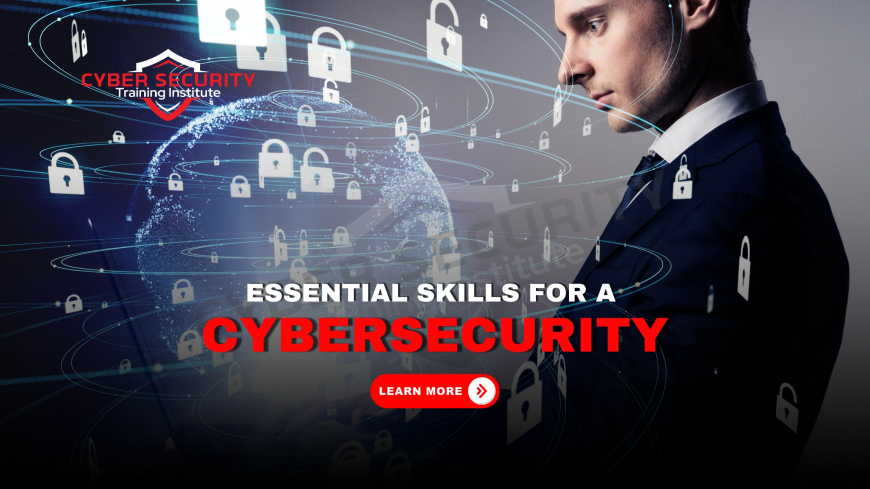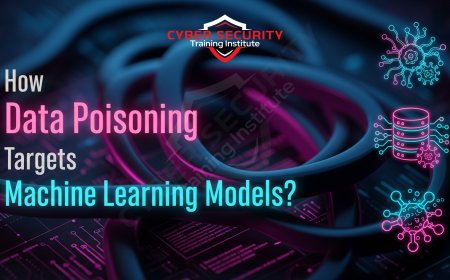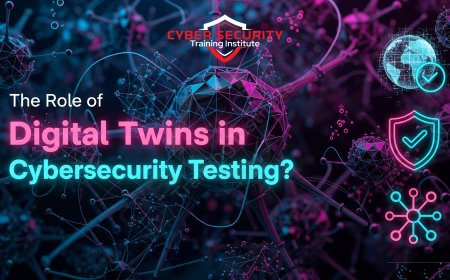What Skills Do You Need for a Career in Cybersecurity?
Imagine waking up to news of a massive data breach at a major company, exposing millions of people's personal information. Or picture hackers disrupting critical infrastructure, causing chaos in everyday life. These aren't just plotlines from thriller movies—they're real threats in our digital world. As we head into 2025, cybersecurity has become one of the most crucial fields, protecting everything from personal emails to national security. But what does it take to build a career in this exciting, ever-evolving domain? If you're tech-savvy, enjoy solving puzzles, or simply want a job that's in high demand, cybersecurity might be for you. In this blog post, we'll explore the key skills—both technical and soft—that can set you on the path to success. We'll break it down simply, explain why each skill matters, and offer tips for beginners. Whether you're a student eyeing your first job or a professional switching careers, understanding these skills can help you navigate the cybersecurity landscape. Let's dive in and uncover what it really takes to thrive in this vital industry.

Table of Contents
- What is Cybersecurity?
- Why Pursue a Career in Cybersecurity?
- Essential Technical Skills
- Important Soft Skills
- Education and Certifications
- How to Develop These Skills
- Entry-Level Positions and Career Progression
- Challenges in the Field
- Conclusion
- FAQs
What is Cybersecurity?
Cybersecurity is essentially the practice of protecting computers, networks, programs, and data from unauthorized access or attacks. In simpler terms, it's like being a digital guardian, ensuring that sensitive information stays safe from hackers and other threats. As our lives become more online—think banking apps, smart homes, and remote work—the need for strong cybersecurity grows.
The field covers a wide range of activities, from preventing breaches to responding when they happen. Professionals in this area deal with threats like malware (harmful software), phishing (fake emails tricking you into giving info), and ransomware (locking files until you pay). According to recent reports, cybercrime is expected to cost the world $10.5 trillion annually by 2025. That's why cybersecurity isn't just a job—it's a mission to keep the digital world secure.
For beginners, it's helpful to know that cybersecurity isn't one-size-fits-all. It includes roles like analysts who monitor threats, ethical hackers who test systems, and managers who oversee policies. No matter the role, the goal is the same: safeguard against risks in an increasingly connected world. If you're curious about tech and enjoy problem-solving, this could be a great fit. But to succeed, you'll need a mix of skills, which we'll explore next.
Why Pursue a Career in Cybersecurity?
In 2025, cybersecurity jobs are booming. With attacks rising—think AI-powered hacks and supply chain breaches—companies desperately need skilled pros. The field offers high salaries, with entry-level roles often starting at $70,000 or more, and experienced experts earning over $150,000. Plus, it's diverse: you could work in finance, healthcare, government, or even entertainment.
Job security is another perk. Demand outpaces supply, with millions of unfilled positions globally. It's also intellectually stimulating—every day brings new challenges, like outsmarting clever hackers. For those switching careers, no tech background is always required; many start with certifications and build from there.
Beyond money and stability, it's rewarding. You're protecting people from identity theft or companies from ruin. In a world where data is gold, cybersecurity pros are the miners' guards. If you value impact and growth, this career path shines bright in 2025.
Essential Technical Skills
Technical skills form the backbone of cybersecurity. These are the hands-on abilities that let you detect, prevent, and fix issues. Don't worry if they sound advanced—we'll explain each one.
First, networking basics: Understanding how data moves across systems, like routers and firewalls (barriers that block unauthorized access). Why? Many attacks target networks, so knowing them helps spot weaknesses.
Programming is key too. Languages like Python for scripting tasks or SQL for databases. You don't need to be a coder pro, but scripting automates checks, like scanning for vulnerabilities.
Encryption and cryptography: This is about scrambling data so only authorized people read it. Essential for protecting sensitive info.
Penetration testing (ethical hacking): Simulating attacks to find holes. Tools like Kali Linux help here.
Incident response: Knowing how to react when a breach happens—containing it and recovering.
Cloud security: With more data in clouds like AWS, skills in securing them are hot. AI knowledge is emerging, as threats use machine learning.
Operating systems (Windows, Linux) and intrusion detection round it out.
Here's a table summarizing key technical skills:
| Skill | Description | Why Important | Level (Entry/Mid/Advanced) |
|---|---|---|---|
| Networking | Understanding data flow and security tools | Prevents network-based attacks | Entry |
| Programming | Scripting in Python, etc. | Automates tasks | Entry-Mid |
| Encryption | Data protection methods | Secures information | Mid |
| Pen Testing | Ethical hacking | Finds vulnerabilities | Mid-Advanced |
| Incident Response | Handling breaches | Minimizes damage | Mid |
| Cloud Security | Protecting cloud environments | Essential for modern data storage | Advanced |
These skills evolve, so staying updated is crucial. Start with basics and build up.
Important Soft Skills
While tech skills get the spotlight, soft skills—personal attributes that help you work well—are equally vital. They make you effective in teams and real-world scenarios.
Communication: Explaining complex threats to non-tech folks, like bosses or clients. Good writing for reports too.
Problem-solving: Thinking creatively to fix issues under pressure.
Critical thinking: Analyzing situations to spot risks.
Teamwork: Collaborating with IT, legal, etc.
Adaptability: Threats change fast; you must learn quickly.
Attention to detail: Missing small things can lead to big breaches.
Ethical judgment: Handling data responsibly.
Time management: Prioritizing in high-stakes environments.
These skills turn tech experts into leaders. Practice through group projects or public speaking.
Education and Certifications
A degree in computer science or IT helps, but isn't always needed. Many succeed with certifications, which prove skills quickly.
Top ones for 2025: CompTIA Security+ for beginners, covering basics. CEH for ethical hacking. CISSP for advanced pros. CISM for management. CCSP for cloud. Google Certificate for entry-level.
Bootcamps offer intensive training. Combine with experience for best results.
How to Develop These Skills
Start with online courses on Coursera or edX. Practice in labs like TryHackMe. Join communities on Reddit.
For soft skills, volunteer or take communication classes. Build a home lab for hands-on. Stay current with blogs and podcasts.
Consistency is key—dedicate time weekly.
Entry-Level Positions and Career Progression
Start as a security analyst, monitoring threats. Or help desk with security focus.
Progress to ethical hacker, incident responder, or CISO. Specialize in areas like cloud or AI security.
Networking at conferences helps advance.
Challenges in the Field
It's high-stress with constant threats. Keeping up with changes is tough. Ethical dilemmas arise too.
But rewards outweigh challenges for many.
Conclusion
To sum up, a cybersecurity career demands technical skills like networking and ethical hacking, plus soft skills such as communication and adaptability. We've covered the basics, why it's appealing, key abilities, education, development tips, paths, and challenges. In 2025, with rising threats, these skills are more valuable than ever. Start small—grab a certification, practice daily—and build your way up. The field needs passionate people like you to keep our world safe. Dive in, stay curious, and you could make a real difference.
FAQs
What is cybersecurity?
Cybersecurity involves protecting digital systems and data from attacks and unauthorized access.
Do I need a degree for cybersecurity?
Not always; certifications and experience can suffice, though a degree helps.
What are the top technical skills?
Networking, programming, encryption, penetration testing, and incident response.
Why are soft skills important?
They help communicate risks, work in teams, and solve problems effectively.
What is the best beginner certification?
CompTIA Security+ covers fundamentals and is widely recognized.
How much do cybersecurity pros earn?
Entry-level around $70,000; advanced roles over $150,000 annually.
Is programming required?
Basic scripting like Python is useful but not always mandatory.
What is ethical hacking?
Legally testing systems for vulnerabilities to improve security.
How can I practice skills?
Use online labs, CTFs, or build a home network for testing.
What is incident response?
The process of handling and recovering from security breaches.
Is cybersecurity stressful?
It can be, due to high stakes, but it's also rewarding.
What role does AI play?
AI helps detect threats but also creates new attack methods.
How to switch careers?
Get certifications, gain IT experience, and network in the field.
What is cloud security?
Protecting data and apps stored in cloud services like AWS.
Are there jobs for beginners?
Yes, like junior analysts or support roles.
What soft skill is most crucial?
Communication, to explain tech to non-experts.
How long to learn basics?
A few months with dedicated study and practice.
What is CISSP?
A advanced certification for experienced security pros.
Can I work remotely?
Many roles offer remote options in 2025.
Why is the field growing?
Increasing cyber threats and digital reliance drive demand.
What's Your Reaction?
 Like
0
Like
0
 Dislike
0
Dislike
0
 Love
0
Love
0
 Funny
0
Funny
0
 Angry
0
Angry
0
 Sad
0
Sad
0
 Wow
0
Wow
0















